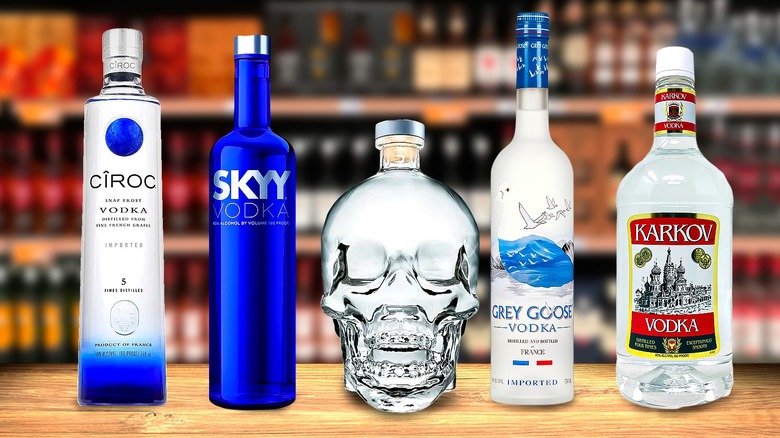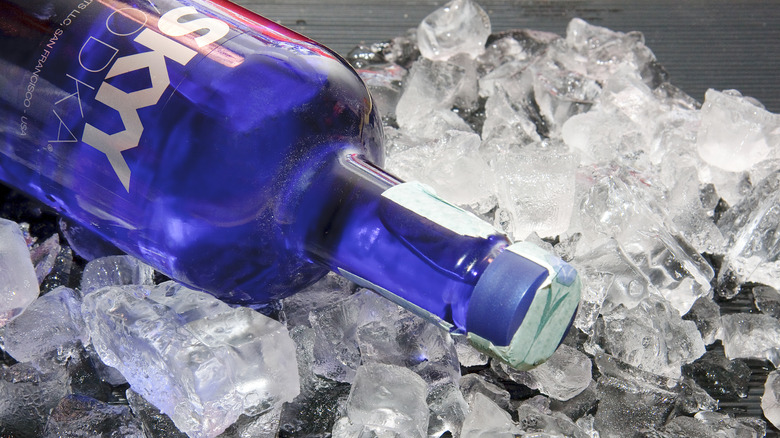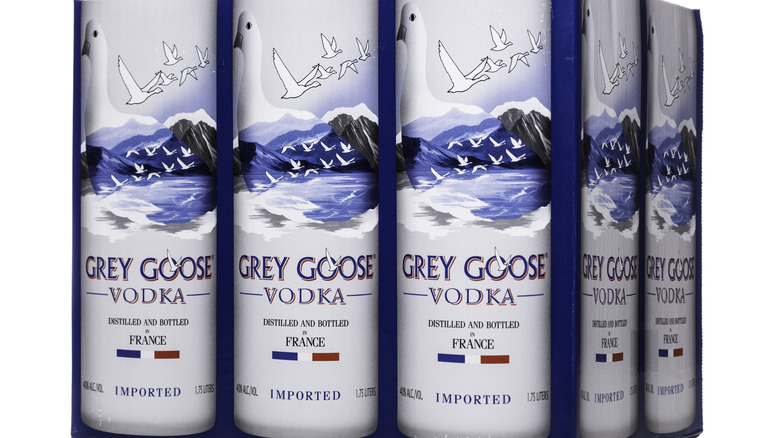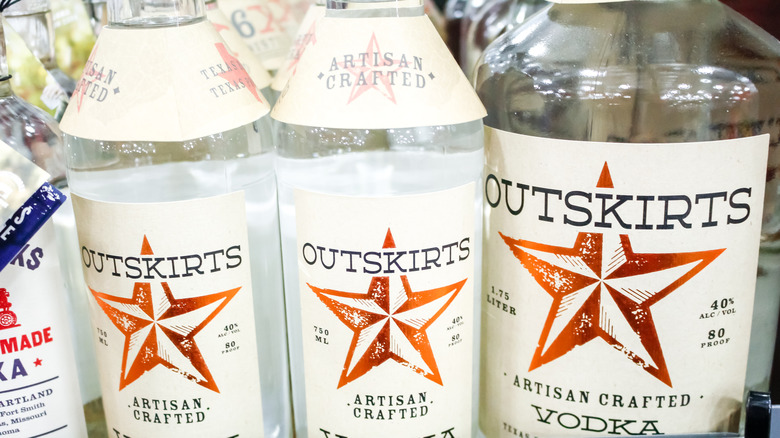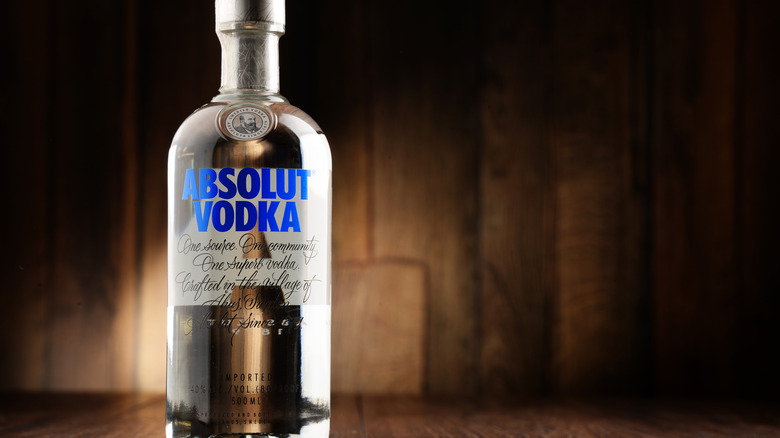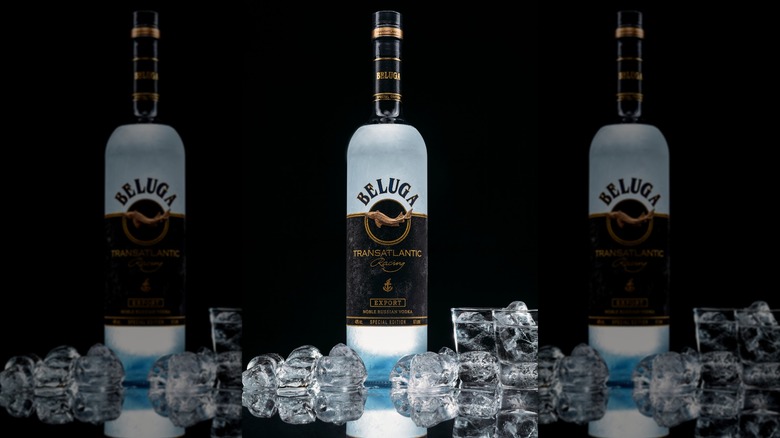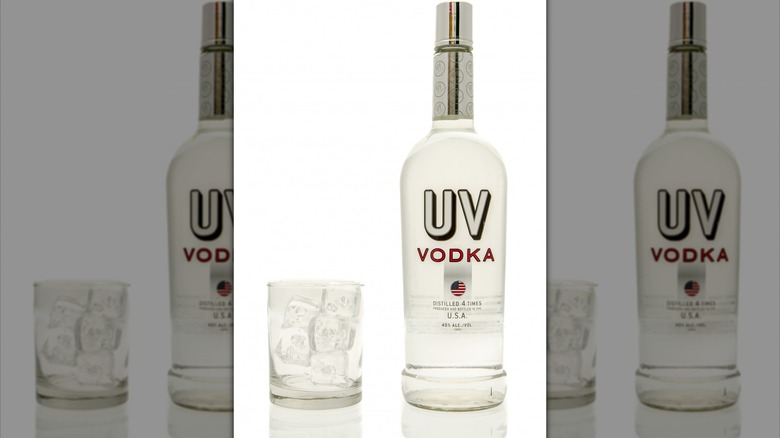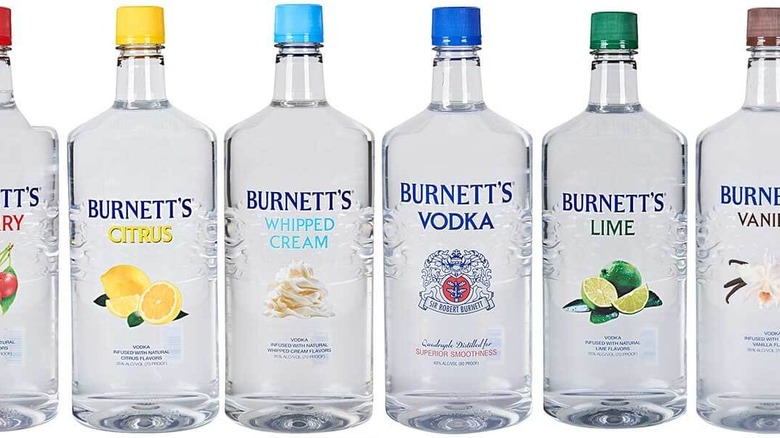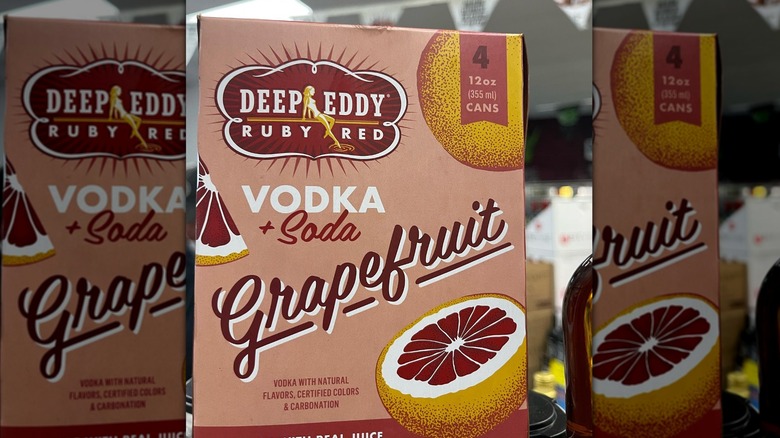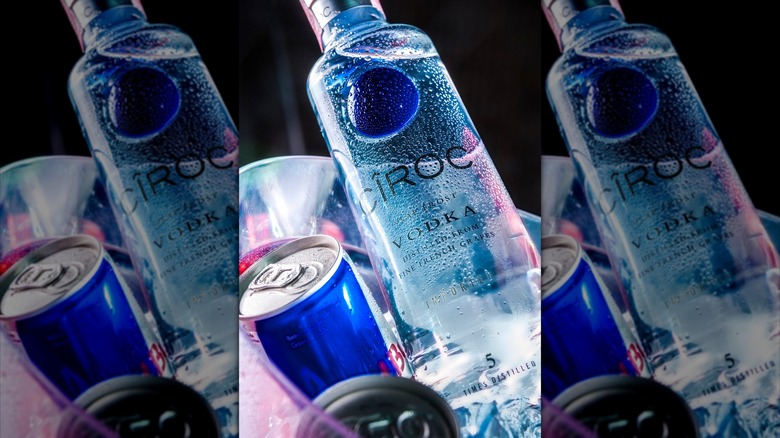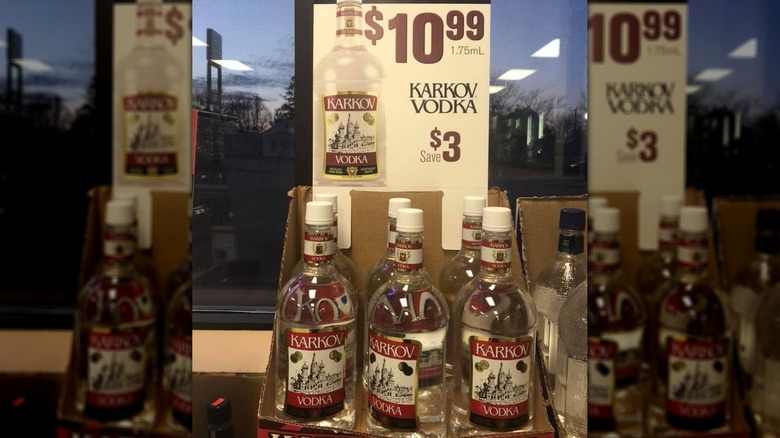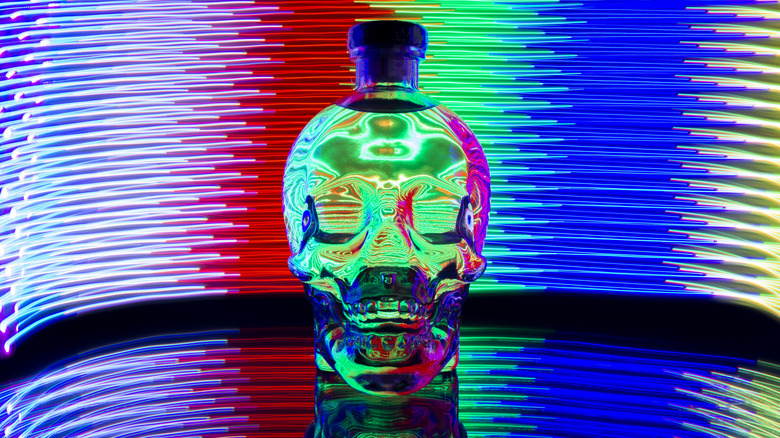12 Worst-Value Vodkas On Liquor Store Shelves
Vodka is supposed to be a clear, pure drink, the closest to ethanol of all the liquors. You may think this means that all vodka more or less tastes the same, but if you've ever ordered a vodka tonic without specifying a brand, you probably already know that the difference between a great vodka and terrible vodka is actually pretty big. The flavor can vary from a subtle, crisp, and clean alcohol, sometimes infused with subtle fruit or other tones, to something more akin to rubbing alcohol.
However, for amateur vodka drinkers, the quality of a particular vodka variety can be hard to gauge, as some of the most overhyped brands populating upscale bars and clubs throughout the country often aren't the best, and many are definitely not worth the price. So how do you distinguish between low-value and high-value vodka brands?
Well, we made it easy by pointing out the worst-value vodka brands on liquor store shelves, so the next time you're browsing labels, at least you know which brands to skip. This list was created using a combination of personal experience tasting a variety of vodkas from around the world, speaking with bartenders and purchasing managers, and scouring the opinions of other knowledgeable vodka drinkers to see if there were any additional insights.
Skyy Vodka
The only way to generally make Skyy Vodka palatable is to chill it in the freezer and pour it while it's still incredibly cold. However, at the college parties where Skyy is usually served, the trademark blue bottles tend to be left out on the table for far too long. While guests are using them to make mixed drinks and imbibe throughout the night, the bottles are warming up. As soon as the temperature of the liquid starts to go down, this vodka becomes increasingly bitter and foul-tasting.
People will usually defend Skyy by pointing out that it's a relatively cheap brand since you can easily find a 750-milliliter bottle for $20 to $25. However, there are quite a few options that are even more budget-friendly and taste infinitely better, like Sobieski, made from rye. Skyy is made in California, using grains sourced from the U.S. and distilled four times in the course of its production.
Grey Goose
No one is saying that Grey Goose is a bad vodka brand; in fact, it's quite far removed from the worst-tasting varieties on the market. Amateur vodka drinkers will usually pick this brand if they are offered a choice at the bar, as Grey Goose has a lot of name recognition, as well as a mediocre taste and bearable aftertaste.
However, for the price this brand charges — an average of $30 to $50 per bottle — it does not provide a good value. The company's website also states that Grey Goose has been distilled only once, which would usually indicate a much cheaper brand, although the company markets it as though extra distillation is not required due to the strength of their ingredients. If you're looking for a highbrow vodka that's worth it, opt for Chopin instead.
To understand why Grey Goose is overpriced, it's important to learn how it was created. U.S. citizen Sidney Frank decided to start a vodka brand and wanted to differentiate his company, not by undercutting the competition, but instead, by making the vodka expensive. This brand is distilled and bottled in France, and this aspect of the vodka is a pretty prominent part of its marketing. Frank knew that France was associated with the production of luxury, upscale items, and for that reason decided to produce his vodka in France over his home in the U.S. — so he could charge a premium price.
Outskirts
You can buy the Texas-produced vodka brand Outskirts in BevMo liquor stores for around $22 to $28 per 750-milliliter bottle, marking it as a mid to above-average vodka in terms of price. Part of the reason for the higher price on these bottles may be because the label boasts that Outskirts is artisan-crafted, and the brand is also exclusive to BevMo stores.
Outskirts is made from American corn and distilled six times, but the taste of the corn is drowned out by the awful-tasting water used to make this particular vodka. Unfortunately, this brand proves that using a good, clean water supply is essential when making any liquor, but especially something that's supposed to be as subtle and clean-tasting as vodka. From the moment the liquor hits your tongue, you will be somewhat overpowered by a sense of drinking something like puddle water.
If you want to try a great U.S.-made vodka brand at a similar price, try something like Colorado's Woody Creek instead. For the money it costs, Outskirts just isn't worth it, especially because the dusty taste will overpower most mixers.
Absolut Vodka
This might be the most well-advertised vodka in the entire world, thanks to a series of print ads with Absolut bottles placed in a variety of contexts and environments. In addition to name recognition, the incredibly successful advertising campaign behind this brand has also lent Absolut an aura of legitimacy in terms of its quality, which is perhaps undeserved.
Absolut usually retails for $18.99 (although, due to its popularity prices can widely vary), marking it as a mid-range vodka in terms of price. While we've sung praises for Absolut's range of vodkas in the past, including Absolut Elyx for Moscow mules, many experienced vodka drinkers admit this vodka can't hold up at this price range compared to the many brands on the market today.
At 40% ABV or 80-proof, this Swedish brand is comparable to most vodkas that usually sit around 80-proof. Unfortunately, the production and distillation process doesn't do much to mask the burn of the high ethanol content. Customers complain about the harsh, bitter taste of the vodka, making it an exceptionally bad choice for a shooter or any drinks near or on the rocks. This particular drink can also leave an unpleasant taste after imbibing. It's a safe bet to say that when you buy a bottle of Absolut, you are paying more for the company's advertising and marketing — and it's worth upgrading to other bottles in its line-up.
Beluga (Gold)
Beluga is yet another upscale brand that generally isn't worth the high-tier price. Though this line of vodka, especially the Beluga Gold variety, actually tastes all right, the prices are more than a bit astronomical. You will be hard-pressed to find a classic bottle of Beluga for under $30 to $40 if you can even get it for that low a cost. Meanwhile, Beluga Gold rarely sells for less than $80 a bottle.
The name does, somewhat purposely, invoke the luxury and sophistication of another high-priced Russian export — Beluga caviar — which is probably meant to justify the cost of a bottle. The taste is somewhat creamy with slight citrus and tropical hints in the nose. You will definitely enjoy it while drinking it, but at the end of the day, it's just not memorable. A vodka option like Ketel One rivals Beluga in flavor and comes with less of a sharp, sour aftertaste, all at a much lower price.
UV Vodka
UV Vodka is one of those rare, cheap, bottom-shelf liquors that still somehow doesn't justify its price. You know UV Vodka is being served at a party because you can usually smell the ethanol fumes from a foot or two away before it ever gets near your mouth. Though the manufacturer advertises that this vodka brand is distilled four times, clearly there is little quality control or adequate filtration happening, as the taste is pretty far from smooth, indicating the presence of a lot of distillation byproducts. At 40% ABV or 80-proof, there are definitely ways to make vodka with this alcohol content more palatable.
UV Vodka comes in plenty of flavors, including raspberry, cake, and cherry, but none of them have managed to significantly improve the taste of the original somewhat harsh vodka. You can find it in liquor stores for $9 to $12 next to superior and similarly priced brands like Luksusowa.
Part of the reason for UV's cheap price is that it packages a lot of its vodka in plastic, rather than glass bottles, which significantly reduces manufacturing costs. However, there's a reason why fine liquors are usually always bottled in glass; plastic is not only more permeable, shortening the shelf life of alcohol and allowing outside air to seep into the liquid, but the material itself leaves behind some of its taste in the actual drink, as opposed to glass, which tends to leave few to no traces in the liquor it houses.
Burnett's Vodka
In any online or real-life discussion of Burnett's Vodka, it won't take too long before someone throws in the somewhat apt descriptor of this particular vodka brand as "paint thinner" or "hand sanitizer". Though it retails for around $7 to $11, making it a pretty attractive option for those hoping to make vodka tonics or screwdrivers on a budget, the headache and hangover you will experience the next day really doesn't make this purchase worth it.
The vodka itself is pretty bitter, in a way that overpowers most mixers if you're looking to dilute the taste in a cocktail. Worst of all, the bitterness doesn't fully go away after you've downed a shot, as Burnett's leaves somewhat of a nauseating aftertaste. Only the youngest drinkers with the most well-functioning livers can generally handle a night of Burnett's without extremely bad side effects afterward.
if you're willing to take the risk, Burnett's does come in a variety of flavors, with blue raspberry being one of the most popular. We recommend an incredibly strong mixer to go along with this vodka or better yet, paying just a little more for Svedka.
Deep Eddy Ruby Red Grapefruit Flavored Vodka
At first glance, Deep Eddy Ruby Red Grapefruit Flavored Vodka might seem like a good bet for amateur vodka drinkers. People assume that the natural flavors in the drink coupled with the taste of grapefruit must alleviate some of the potent alcohol flavor people associate with vodka.
Surprisingly enough, the extra flavors in this particular brand manage to do none of that. The best vodka generally has a very subtle taste, as the optimal distillation process should produce a liquor that is relatively clean to drink and neutral on the palate. Deep Eddy's vodkas, and especially their Ruby Red Grapefruit line, manage to taste overly sweet while being swallowed, and then follow up with a markedly bitter aftertaste that might test your gag reflex.
Some people think of buying this brand, which usually retails at around $10 to $16, in hopes of having something like a mixed drink on hand without even having to make one, thanks to the grapefruit. It's much better to skip Deep Eddy's Ruby Red Grapefruit line, and just get a similarly-priced superior vodka instead to mix with grapefruit juice or soda.
Gordon's Vodka
It's a little-known fact that Gordon's, the world-famous gin company, also makes vodka under their label. If you haven't tried it yet, you're not missing much, as the company should perhaps stick to making the liquor they know best, even though that doesn't seem to be the brand's forte either. The plastic bottle Gordon's comes in is already an indication that quality is not a top factor in the drink's production.
Unlike some of the other entries in this list, the problem isn't that Gordon's is exceptionally awful or very expensive. It's a pretty low to medium-priced vodka, and the taste is below average. For a 750-milliliter bottle, you will end up paying $11 to $16. However, the problem with Gordon's Vodka is that, at that price point, there are a lot of superior budget-friendly vodka options, such as the tried and true classic, Stolichnaya. However, if you do have a bottle lying around, try using it as a mixer instead of drinking it as a shooter or on the rocks, as the vodka is a little too low-quality to drink straight.
Ciroc
Ciroc was the vodka of choice at clubs for a while, partly thanks to its great marketing campaign featuring Sean Diddy Combs, the brand owner, and its inclusion in many popular hip-hop songs. This gave Ciroc a reputation as a fancy, upscale vodka brand, with a lot of customers assuming the high price point reflected its quality. However, for a brand sold at a price of $30 to $40 in liquor stores, it is much, much too expensive for the average quality vodka it offers.
Unsurprisingly, this overpriced vodka is also made in France, but unlike Grey Goose, it's made from grapes — hardly a traditional source of vodka. Furthermore, the grapes lend a sweetness to the liquor which can sometimes feel overpowering for a vodka. The sweet taste also negatively affects the ability of Ciroc to mix well with certain liquids, especially fruit juices like orange and cranberry juice, two of the most popular combinations for easy vodka cocktails in a hurry.
The brand comes in a few different flavors, including pineapple and mango, which only heighten the drink's sweetness. Inexperienced vodka drinkers might actually favor this flavor profile, but those who want some real, top-shelf, traditional vodka will be disappointed.
Karkov Vodka
Karkov has become known as the vodka of choice for college students who don't have the budget for anything better, haven't tasted a lot of vodkas, and can handle blinding hangovers better than the average person thanks to their youth. The nickname for Karkov in the vodka-drinking community is "Karcrash", a play on the words car crash. One of the reasons it's so disliked is because it doesn't just taste bad going down; the aftertaste, or more accurately, afterburn, will linger for a while, and your head and stomach will not thank you the next day.
Though the name of this brand sounds Russian, it's actually produced in Minnesota. The fact that it's domestically produced may help explain why it's relatively cheap in U.S. liquor stores, usually retailing for $8 to $11. That being said, there are quite a few budget-friendly vodka brands that don't tend to mimic the taste of fuel, so buying Karkov still seems like a bad value proposition.
Crystal Head
There's no denying that the design of Crystal Head vodka looks incredibly cool. It's probably what attracts most drinkers to the bottle in the first place. After taking a closer look and realizing that a single 750-milliliter vodka goes for $50 to $60, you might also decide to back away from it.
Why the premium price? For one thing, the brand is owned by former "SNL" cast member and "Ghostbusters" actor Dan Aykroyd, and celebrity-owned liquor brands tend to sell for slightly higher than they should. Second, the distinctive glass skull packaging of the brand definitely costs a fair amount of extra money to produce. Lastly, Crystal Head markets itself as gluten-free and Kosher-certified, and the company proudly touts the fact that it's made from Canadian corn, blended with "pristine water" from Newfoundland, and filtered through Herkimer diamonds.
While all these rationales might sound like justifiable reasons to pay a higher price at first, and the vodka actually does have a fairly clean and clear taste, it's just not worth it to pay over $50 for a vodka bottle. Moreover, a lot of the jargon used to market this particular brand doesn't actually mean much, as "Herkimer diamonds", for example, are actually just a kind of quartz, and don't make much of a difference in the final product anyway. If you want to make some vodka cocktails at home or for a party, you can find much better (and cheaper) brands on the market.
